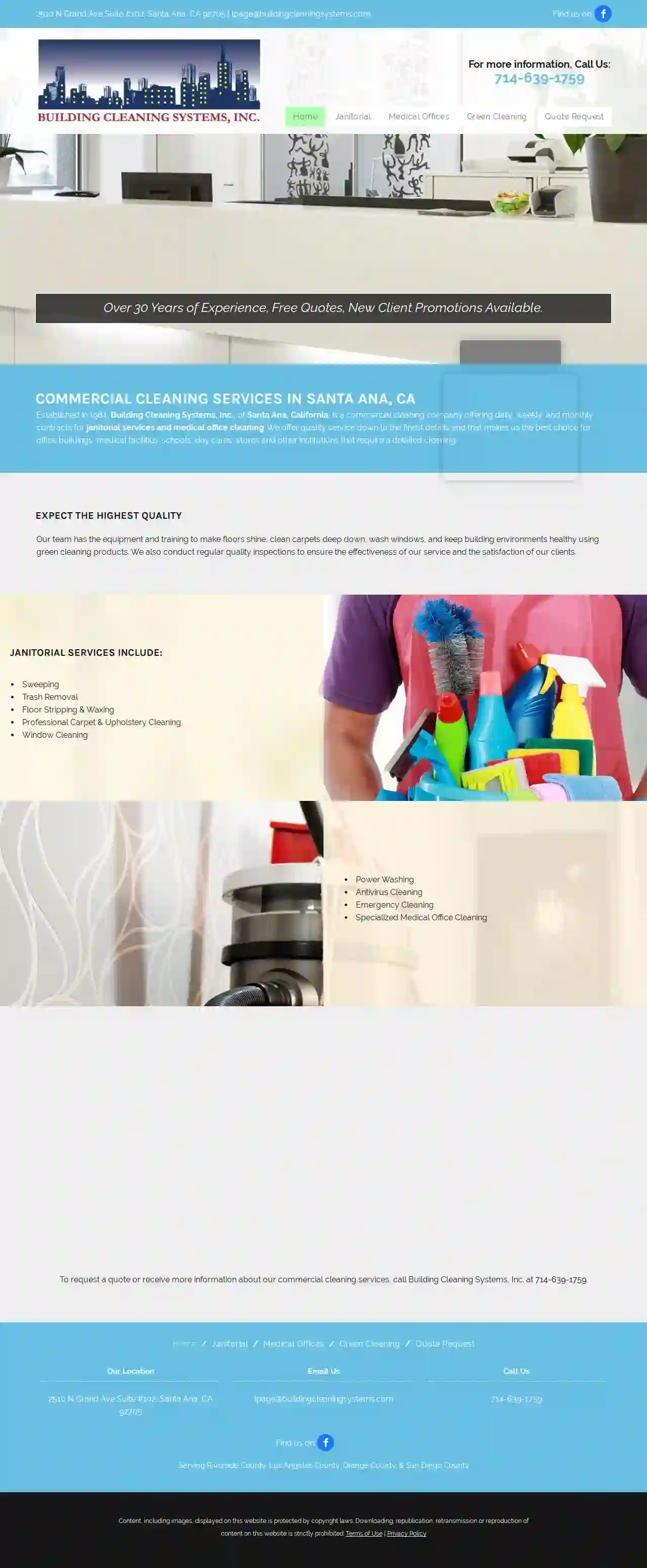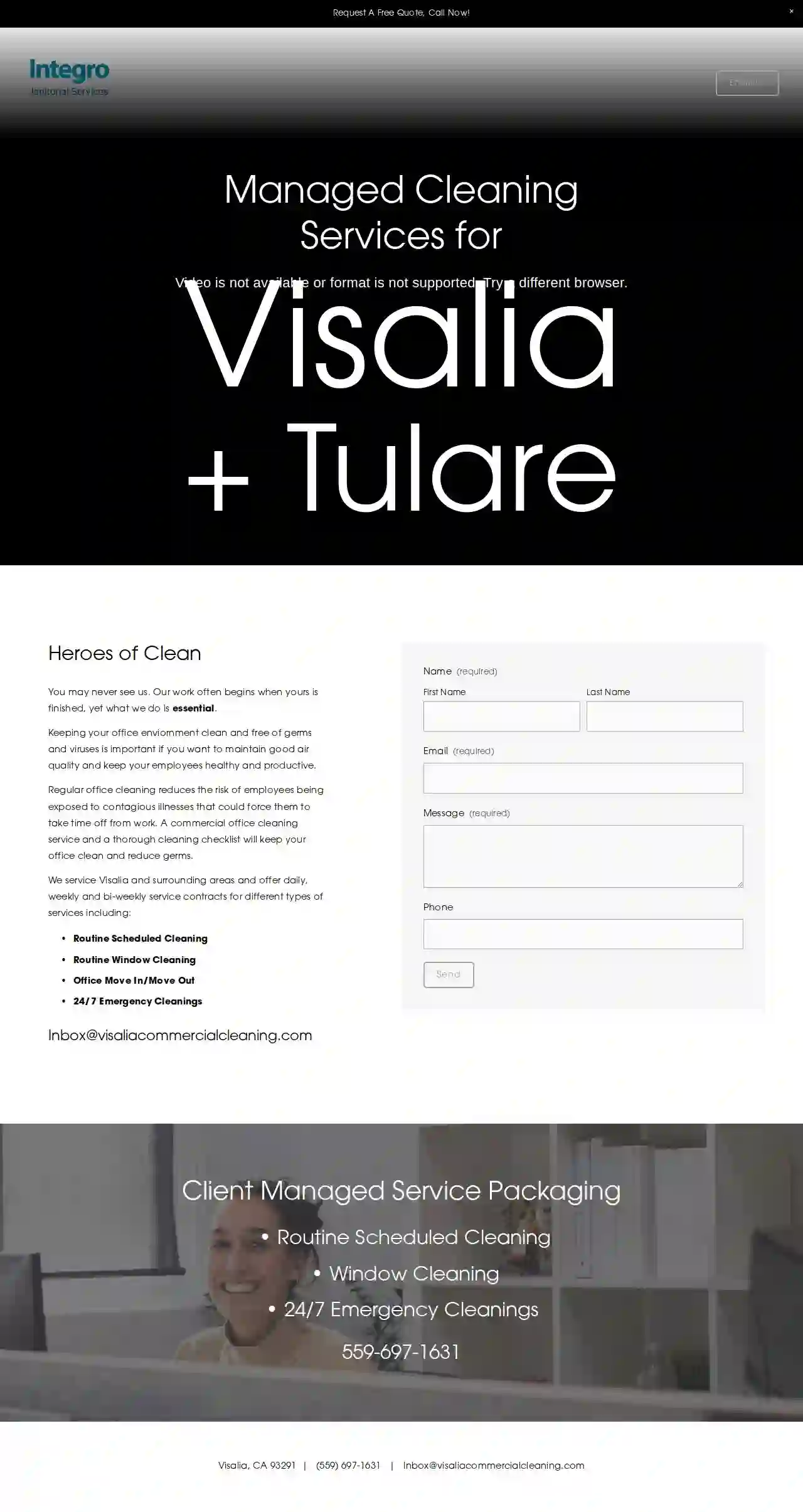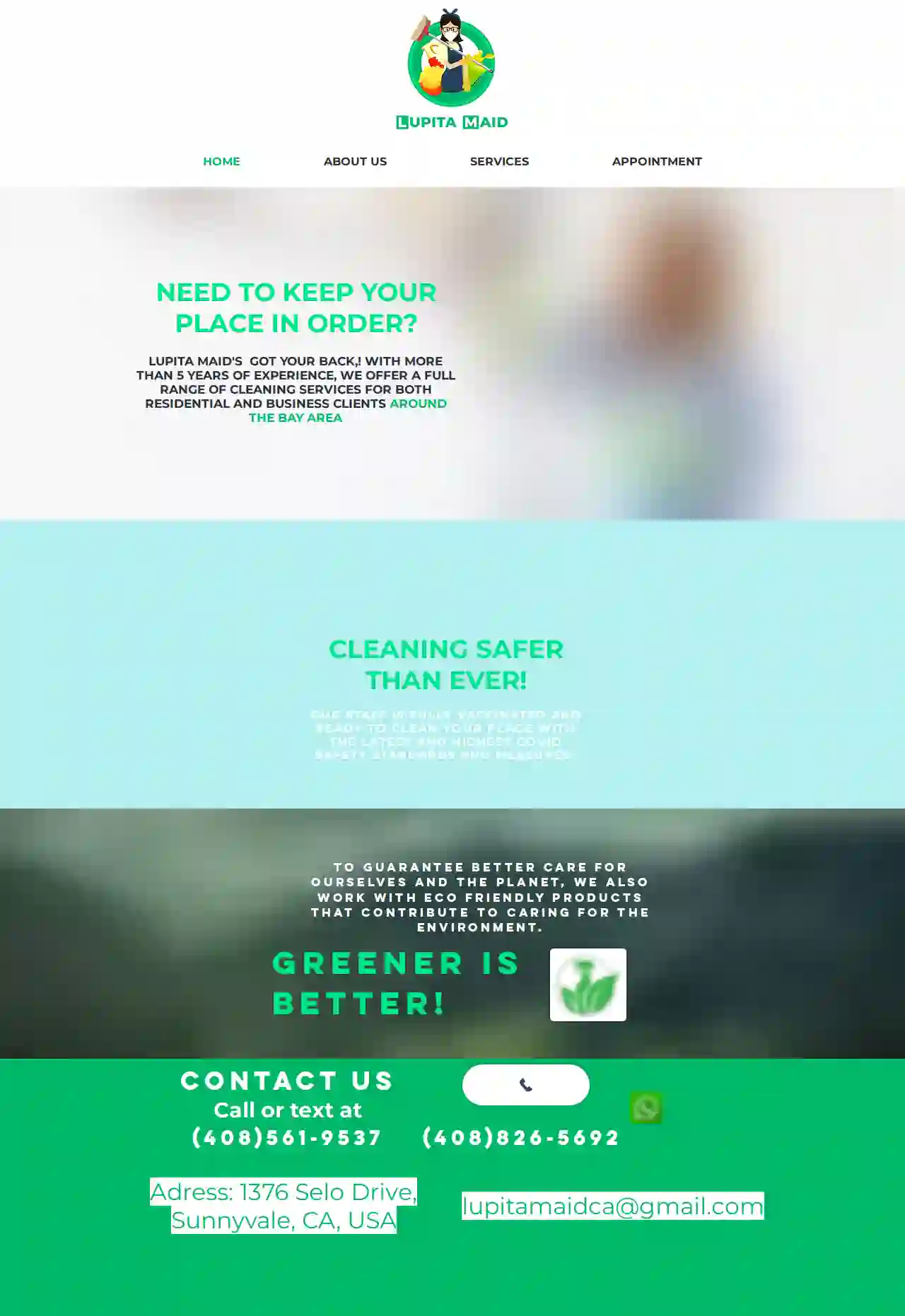Cleaning Services Lynwood
Top House Cleaning in Lynwood
Receive up to 3 Local Cleaners quotes for your project today! Compare profiles, reviews, accreditations, portfolio, etc... and choose the best offer.
Service Needed
City or Town
- IT
ITR Cleaning Services
56 reviewsModesto, US- Services
- Why Us?
Get Quote 
Building Cleaning Systems
53 reviewsOrange, US- Services
- Why Us?
Get Quote
R2 Dos Maintenance
53 reviewsFontana, US- Services
- Why Us?
Get Quote- Be
Best SCV Cleaning Inc.
57 reviewsSanta Clarita, US- Services
- Why Us?
Get Quote 
Instant Cleans
522 reviewsVista, US- Services
- Why Us?
Get Quote
Integro Janitorial Services
51 reviewsVisalia, US- Services
- Why Us?
Get Quote
Pro-Clean Janitorial & Building Maintenance
52 reviewsSan Jose, US- Services
- Why Us?
Get Quote- Fr
Fresh N Clean Solutions
57 reviewsGlendale, US- Services
- Why Us?
Get Quote 
Alves Residential and commercial Cleaning Services in San Francisco
538 reviewsSan Francisco, US- Services
- Why Us?
Get Quote
Lupita Maid
58 reviewsSunnyvale, US- Services
- Why Us?
Get Quote
Over 60,241+ Janitorial Businesses in our network
Our janitorial service providers operate in Lynwood and surroundings!
CleaningMatch has curated and vetted the Best Cleaning Businesses in Lynwood. Find a top & reliable pro today.
Frequently Asked Questions About Cleaning Services
Find answers to common questions about cleaning services and hiring cleaning companies in the USA.
- Frees up your time: Cleaning can be time-consuming, especially for larger properties or busy individuals. Hiring a cleaning service allows you to focus on other priorities, such as work, family, or leisure activities.
- Ensures a deeper clean: Professional cleaners are trained in effective cleaning techniques and have access to specialized equipment, resulting in a more thorough clean than you might achieve on your own.
- Reduces allergens and improves hygiene: Thorough cleaning removes dust, allergens, and germs, creating a healthier living environment, particularly for those with allergies or sensitivities.
- Reduces stress and improves well-being: Coming home to a clean and tidy home can reduce stress and promote a sense of calm and order.
- White Vinegar: A versatile cleaner that cuts through grease, removes stains, and deodorizes. Mix equal parts water and vinegar for a general-purpose cleaner.
- Baking Soda: A natural abrasive and deodorizer. Sprinkle baking soda on surfaces, let it sit, then scrub and rinse.
- Lemon Juice: Acts as a natural bleaching agent and disinfectant. Mix lemon juice with water for a cleaning solution or use it directly on stains.
- Castile Soap: A gentle and biodegradable soap made from plant oils. Mix a few drops of castile soap with water for a versatile cleaning solution.
- Essential Oils: Add a few drops of essential oils like tea tree oil or lavender oil to cleaning solutions for a natural fragrance and antibacterial properties.
- Online Directories: Use online directories like CleaningMatch to search for cleaning services in your area. Filter your search results by the specific cleaning type you need.
- Search Engines: Use search engines like Google to find cleaning services specializing in your desired cleaning type. For example, search for 'post-construction cleaning services near me' or 'eco-friendly cleaning services in [city name].'
- Ask for Referrals: Ask friends, family, neighbors, or colleagues if they know of any reputable cleaning services specializing in your desired cleaning type.
- Check Company Websites: Visit the websites of cleaning services in your area to see if they list the specific cleaning type you need among their services.
- Contact Companies Directly: Contact cleaning companies directly to inquire about their specialization in your desired cleaning type.
- Experience: 'How long have you been in business, and what type of cleaning services do you specialize in?'
- Licensing and Insurance: 'Are you licensed, insured, and bonded? Can I see proof of coverage?'
- Background Checks: 'Do you conduct background checks on your employees?'
- Cleaning Supplies: 'Do you provide your own cleaning supplies and equipment, or should I provide them?'
- Cleaning Methods: 'What cleaning methods and products do you use?'
- References: 'Can you provide references from previous clients?'
- Scheduling and Availability: 'What days and times are you available for cleaning?'
- Pricing and Payment: 'What is your pricing structure, and what payment methods do you accept?'
- Cancellation Policy: 'What is your cancellation policy?'
- Satisfaction Guarantee: 'Do you offer a satisfaction guarantee? What happens if I'm not happy with the service?'
Are cleaning services worth it?
The value of a cleaning service depends on your individual circumstances and priorities. Consider these benefits:
If you value these benefits and find the cost justifiable, cleaning services can be a worthwhile investment in your time and well-being.
If you value these benefits and find the cost justifiable, cleaning services can be a worthwhile investment in your time and well-being.
What are some eco-friendly cleaning solutions?
Eco-friendly cleaning solutions are becoming increasingly popular as people prioritize sustainability and a healthier indoor environment. Here are some effective and eco-friendly cleaning solutions:
Remember to test these solutions on a small, inconspicuous area first to ensure they don't damage delicate surfaces.
Remember to test these solutions on a small, inconspicuous area first to ensure they don't damage delicate surfaces.
How do I find a cleaning service that specializes in [specific type of cleaning]?
If you need a cleaning service specializing in a particular type of cleaning, such as post-construction cleaning, window cleaning, or green cleaning, follow these steps:
By using these methods, you can find a qualified cleaning service that meets your specific cleaning needs.
By using these methods, you can find a qualified cleaning service that meets your specific cleaning needs.
What should I ask a cleaning service before hiring them?
Before hiring a cleaning service, consider asking these questions to ensure they meet your requirements and expectations:
By asking these questions, you can assess their professionalism, reliability, and suitability for your cleaning needs.
By asking these questions, you can assess their professionalism, reliability, and suitability for your cleaning needs.
Are cleaning services worth it?
The value of a cleaning service depends on your individual circumstances and priorities. Consider these benefits:
If you value these benefits and find the cost justifiable, cleaning services can be a worthwhile investment in your time and well-being.
- Frees up your time: Cleaning can be time-consuming, especially for larger properties or busy individuals. Hiring a cleaning service allows you to focus on other priorities, such as work, family, or leisure activities.
- Ensures a deeper clean: Professional cleaners are trained in effective cleaning techniques and have access to specialized equipment, resulting in a more thorough clean than you might achieve on your own.
- Reduces allergens and improves hygiene: Thorough cleaning removes dust, allergens, and germs, creating a healthier living environment, particularly for those with allergies or sensitivities.
- Reduces stress and improves well-being: Coming home to a clean and tidy home can reduce stress and promote a sense of calm and order.
If you value these benefits and find the cost justifiable, cleaning services can be a worthwhile investment in your time and well-being.
What are some eco-friendly cleaning solutions?
Eco-friendly cleaning solutions are becoming increasingly popular as people prioritize sustainability and a healthier indoor environment. Here are some effective and eco-friendly cleaning solutions:
Remember to test these solutions on a small, inconspicuous area first to ensure they don't damage delicate surfaces.
- White Vinegar: A versatile cleaner that cuts through grease, removes stains, and deodorizes. Mix equal parts water and vinegar for a general-purpose cleaner.
- Baking Soda: A natural abrasive and deodorizer. Sprinkle baking soda on surfaces, let it sit, then scrub and rinse.
- Lemon Juice: Acts as a natural bleaching agent and disinfectant. Mix lemon juice with water for a cleaning solution or use it directly on stains.
- Castile Soap: A gentle and biodegradable soap made from plant oils. Mix a few drops of castile soap with water for a versatile cleaning solution.
- Essential Oils: Add a few drops of essential oils like tea tree oil or lavender oil to cleaning solutions for a natural fragrance and antibacterial properties.
Remember to test these solutions on a small, inconspicuous area first to ensure they don't damage delicate surfaces.
How do I find a cleaning service that specializes in [specific type of cleaning]?
If you need a cleaning service specializing in a particular type of cleaning, such as post-construction cleaning, window cleaning, or green cleaning, follow these steps:
By using these methods, you can find a qualified cleaning service that meets your specific cleaning needs.
- Online Directories: Use online directories like CleaningMatch to search for cleaning services in your area. Filter your search results by the specific cleaning type you need.
- Search Engines: Use search engines like Google to find cleaning services specializing in your desired cleaning type. For example, search for 'post-construction cleaning services near me' or 'eco-friendly cleaning services in [city name].'
- Ask for Referrals: Ask friends, family, neighbors, or colleagues if they know of any reputable cleaning services specializing in your desired cleaning type.
- Check Company Websites: Visit the websites of cleaning services in your area to see if they list the specific cleaning type you need among their services.
- Contact Companies Directly: Contact cleaning companies directly to inquire about their specialization in your desired cleaning type.
By using these methods, you can find a qualified cleaning service that meets your specific cleaning needs.
What should I ask a cleaning service before hiring them?
Before hiring a cleaning service, consider asking these questions to ensure they meet your requirements and expectations:
By asking these questions, you can assess their professionalism, reliability, and suitability for your cleaning needs.
- Experience: 'How long have you been in business, and what type of cleaning services do you specialize in?'
- Licensing and Insurance: 'Are you licensed, insured, and bonded? Can I see proof of coverage?'
- Background Checks: 'Do you conduct background checks on your employees?'
- Cleaning Supplies: 'Do you provide your own cleaning supplies and equipment, or should I provide them?'
- Cleaning Methods: 'What cleaning methods and products do you use?'
- References: 'Can you provide references from previous clients?'
- Scheduling and Availability: 'What days and times are you available for cleaning?'
- Pricing and Payment: 'What is your pricing structure, and what payment methods do you accept?'
- Cancellation Policy: 'What is your cancellation policy?'
- Satisfaction Guarantee: 'Do you offer a satisfaction guarantee? What happens if I'm not happy with the service?'
By asking these questions, you can assess their professionalism, reliability, and suitability for your cleaning needs.